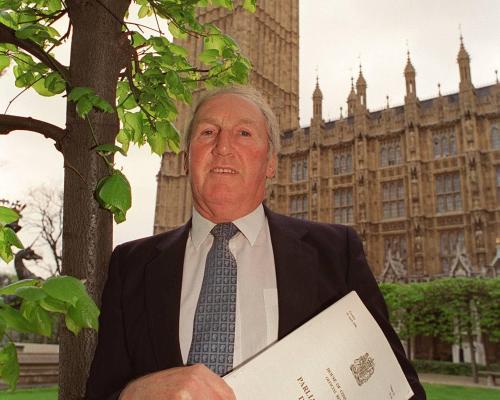
The life and career of Sir Bill O’Brien, the former Labour MP, who has died aged 96, could easily have been adapted by any self-respecting novelist to provide a snapshot of the characteristic 20th-century working man (and they were always men) who becomes an admired and respected solid citizen, having successfully harnessed decades of gritty industrial experience to elected public office, first in the town hall and then at Westminster.
The archetype was further richly fulfilled in O’Brien’s case as he was a Yorkshire miner, born into poverty, who learned to have the courage to speak truth to power within his own dying industry – which meant standing up to Arthur Scargill as leader of the National Union of Mineworkers (NUM) – and always to defend what he believed to be the right course of action, irrespective of political fashion.
He was categorised as a moderate, but in reality he was an unapologetic pragmatist. “I’m not extreme in any way,” he once said. He would also cheerfully acknowledge that sometimes he agreed with the views of Tony Benn – regarded at the time as the arbiter of Labour’s left – and sometimes he did not.
He first went to work at the coalface of Glasshoughton colliery, near Castleford, West Yorkshire, as a teenager at the end of the second world war and, after 38 years in the industry, was elected to the House of Commons as the MP for Normanton, south-east of Leeds, in 1983. He had already spent 30 years as a councillor, from 1951 as a member of Knottingley urban district council and subsequently, from 1973, on Wakefield metropolitan district council, where he chaired the finance committee and was deputy leader for a decade.
His local government experience gave him an authority and an understanding of transport, housing and environmental issues, as well as the economic implications of public spending in those areas. His years down the pit made his voice one that deservedly won an audience during his 22 years in the Commons, a period that coincided with the decades that saw the effective closure of the British coal industry.
Throughout his career, he argued for a massive redistribution of funding to Yorkshire and the north of England, asserting that the responsibilities of devolved political power mattered far less than the availability of greater resources, while he also sought investment in “clean” coal technology. In 2003 he warned the prime minister, Tony Blair, about the findings of a report by the Institution of Civil Engineers predicting that future gas supplies piped to the UK could be sourced from politically unstable countries and thus vulnerable to supply failures, sabotage and terrorism.
In O’Brien’s maiden speech in July 1983, on the then controversial Thatcher government policy of council house sales, he typically reasoned that some sales of municipal housing were popular, but insisted that sales should only be allowed to go ahead on a voluntary basis. He was appointed to the public accounts committee shortly thereafter and was a diligent member until 1988, also serving on the energy select committee from 1986 until 1988.
He was appointed by Neil Kinnock to the opposition frontbench as a member of the environment team in the wake of the 1987 general election, having nearly doubled his majority in what had been a redrawn seat when he won it at the low point in his party’s electoral fortunes four years earlier. In 1992, John Smith switched him to the Northern Ireland brief, where his status as a Roman Catholic had resonance.
He returned to the backbenches when Blair became leader and, for the remainder of his tenure as an MP, served as a member of the select committee dealing with the environment, transport and local government. After standing down as an MP in 2005 he remained active in local affairs. A magistrate and a school governor, he continued to campaign on political issues in Pontefract, where he lived. He was knighted in the Labour government’s retirement honours list in 2010.
O’Brien was born into a mining family in the Glasshoughton neighbourhood of Castleford and, after attending St Joseph’s Roman Catholic school in the town, joined the workforce at the local colliery along with three of his four brothers. He signed up with the Labour party and the NUM aged 16, and early on discovered an aptitude for organising, which led him into trade union activism, becoming branch secretary at Glasshoughton. He also studied for an extramural degree at Leeds University and was awarded a BEd degree in 1978.
His political stance brought him into recurring conflict with Scargill, notably in 1976 when O’Brien supported the Sheffield Star in a court case brought against the newspaper by Scargill. Having nevertheless won his legal case, Scargill subsequently attempted to suspend O’Brien from holding union office. This resulted in further legal action, this time won by O’Brien.
During the selection procedure for the Labour candidate for Normanton – after the announced retirement of the sitting MP – O’Brien then successfully defeated the candidate proposed by Scargill. The two also clashed during the subsequent year-long miners’ strike of 1984-85, which O’Brien wholeheartedly supported, while rejecting the tactics of the union leadership.
In retirement O’Brien researched and published a book on the history of the Prince of Wales colliery in Pontefract, which had once served as the town’s largest employer – with 2,200 on the payroll in 1958 – in its 133 years of operation until closure in 2002.
In 1978 he married Jean Scofield, who survives him, as does his daughter, Darrel, from an earlier marriage, and her two daughters, Kaye and Diane.
• Bill (William) O’Brien, miner and politician, born 25 January 1929; died 18 May 2025







